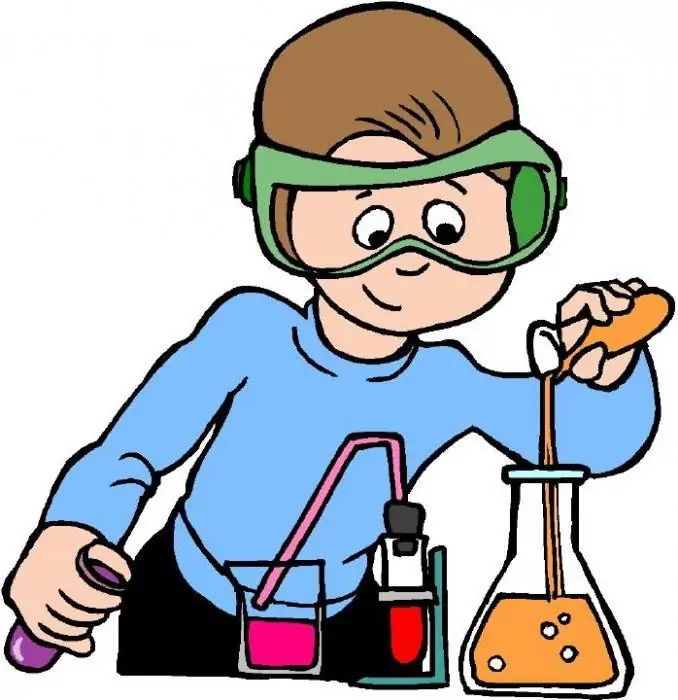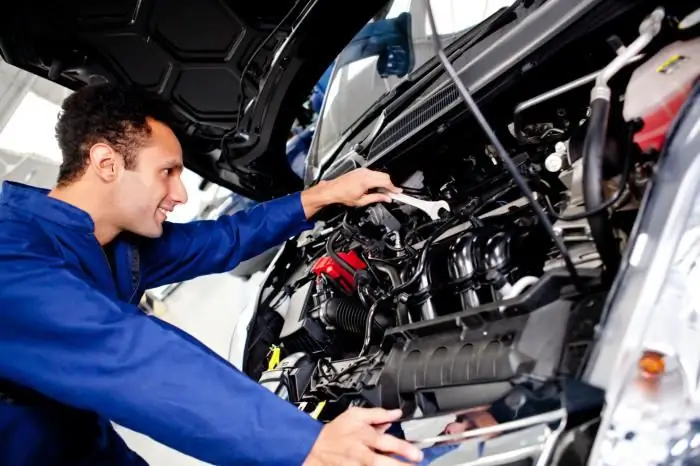2026 Author: Howard Calhoun | calhoun@techconfronts.com. Last modified: 2025-01-24 13:10:25
The work of the railway is very similar to the enterprise, many employees of different professional fields are involved in its normal functioning. Basically, graduates of the railway technical school become employees of this sphere. But sometimes specialists who have received advanced training with ordinary vocational education are also hired. It all depends on the complexity and responsibility of the position.
General information
Various vehicles are used to transport goods and passengers, including locomotives, trains, trolleybuses, and so on. All this requires repair and maintenance for normal and serviceable performance. And this is what a rolling stock mechanic does, he determines the serviceability and quality of parts and the entire mechanism, identifies defects and inaccuracies in the assembly of equipment and eliminates them. The duties of this employee include carrying out locksmith work, replacing the complete set of railway vehicles, as well as adjusting and testing assembled units after repair work.
Requirements
This employee is a worker and can only get a position after completing a complete secondary and vocational education. Employers also allow applicants who have received professional training in the workplace without additional education, in addition to secondary education, to the service. This position is divided into categories. In order to receive the next rank, a rolling stock repairman must undergo advanced training and work at the relevant enterprise for at least one year.

Employers pay attention to workers with good physical fitness. They must be hardy, have good hearing, vision, memory. What is important is a linear and volumetric eye, the ability and skills of controlling the hands. To perform duties, a person must have developed visual and technical acumen, good resistance to stress. It is not enough to graduate from a railway technical school and possess all these skills, you also need to approach it for he alth reasons. Persons with diseases of the musculoskeletal system, respiratory tract, cardiovascular and nervous systems are not allowed to work. Also, allergy sufferers, people with hearing, vision or mental disabilities cannot count on the position.
First Grade Knowledge and Responsibilities
Before starting their work, an employee with the first category must learn the basics of plumbing, understand the names, brands, purpose and methods of using tools, materials, simplefixtures and instrumentation. He must also understand the fluids that are used to lubricate and flush railway parts.

He is responsible for threading minor parts such as nuts and bolts. He may be instructed to clean parts from nicks, burrs and other defects that occur during welding. He is engaged in cutting, cutting and filing parts. Also in his duties is the maintenance of simple plumbing fixtures and their sharpening.
Knowledge and Responsibilities for Grade Two
The employee in this position is obliged to study the principle by which the maintenance and repair of rolling stock is carried out. In addition, he must understand the purpose and rules of operation of the most common types of special and universal tools and instrumentation. His knowledge includes basic locksmithing techniques during repairs and assembly of simple assemblies that are connected using bolts and rollers. He must understand the mechanical properties of materials that come to him for processing. To study tolerances, landings, qualifications, roughness. He must also know how to properly couple and uncouple wagons and tugs.

Rolling stock repairman performs processing, manufactures and repairs parts according to 12-14 qualifications. He creates simple parts and high-quality materials,carries out assembly and disassembly of parts and simple assemblies that are attached to each other by means of rollers and bolts. He may be tasked with drilling holes using mechanized and hand tools. The duties of an employee may include threading with dies and taps in the configuration of rail transport fasteners. In addition, his competence may include a scene and uncoupling of wagons, tugboats, etc.
Knowledge and responsibilities for the third grade
During the training period, a rolling stock repairman of the third category must learn how they are arranged, what they are intended for and how the main components related to objects requiring repair work interact. Know how special and universal fixtures and instrumentation are arranged. Understand the basic properties of the materials with which he has to work. What are the types of connection of components and parts, roughness, tolerances, fit, qualifications. In addition, his knowledge must include the technical knowledge necessary to carry out test adjustments on the mechanisms entrusted to him.

The instruction for a rolling stock locksmith assumes that he carries out repair work and is engaged in the manufacture of parts according to 11-12 qualifications. He must disassemble the auxiliary parts of the objects that are entrusted to him for repair work, provided that the parts of the composition have a tight and sliding fit. He is engaged in the installation and disassembly of some pneumatic devices.systems. The employee connects the nodes and cotter pins, while observing the size, location and conditions of the mobile landings. He may be entrusted with testing the performance of pneumatic systems that operate under pressure. He is also responsible for the regulation and testing of some mechanisms of railway equipment.
Knowledge and Responsibilities for Grade Four
In order to fulfill the assigned duties with high quality, the mechanic of the rolling stock of the fourth category must have certain knowledge, namely, to learn the main parts of the objects entrusted to him for repair. Including their design, what they are intended for, how they interact and how to properly assemble and disassemble them. How they are arranged, what they are intended for and how to properly operate the control and measuring tools. Learn the design of special and universal equipment, know the technical conditions for assembly, testing and adjustment of units and components of the composition.

His duties include repair work and the manufacture of parts according to 7-10 qualifications. The rolling stock locksmith must disassemble and assemble the main units with different types of landings. The employee determines how high-quality and workable the parts are, and also determines what kind of repair they need. To carry out the connection of groups and nodes with all types of fit, in addition to tight and tension. He regulates and tests the assembled units, and also draws up documentation, namely defective statements.
Knowledge and Responsibilities for Grade 5
An employee, before starting work, must study the design features, performance characteristics and interaction of the nodes that were transferred to him for repair work. Learn all the technical conditions for the repair, know how the main components are assembled, how to control and regulate the assembly and operation of the components. His duties may include dismantling, repair work and installation of equipment. Moreover, knots with a tight and tense fit are trusted to him. He must also perform locksmith work in conditions of 6-7 qualifications. The employee checks whether parts and assemblies were assembled correctly, scrapes parts with large fitting areas, adjusts and tests mechanisms and assemblies after assembly.
Knowledge and Responsibilities for Grade 6
A rolling stock locksmith should know what are the ways of marking and installing nodes, checking installation work, and the accuracy of the quality of repair work. Also, his knowledge should include methods that allow you to check and identify damaged parts.

He must be familiar with the methodology for restoring the functionality of the rolling stock. The duties of this employee include testing, checking for accuracy and commissioning of devices and equipment received for repair. It must detect and prevent defects in all assembly groups of the train.
Knowledge and responsibilities for Grade 7
The employee mustlearn the design features of installations, assemblies and other equipment of all series that come in for repair work. Know what rules and technologies exist for adjustment using stands, centering and running. Methods of diagnostics, testing, permissible loads on equipment, as well as preventive measures aimed at preventing wear and tear and breakdowns.

He is responsible for the maintenance and repair of railway vehicles, including diagnostic work, adjustment, fitting, running-in parts. He must carry out repairs and debug electronic equipment, ensure the safe use of compounds.
Recommended:
Chemist-technologist: description of the profession, features of training, pros and cons

A chemist-technologist is a specialist who develops new or improves old technological processes for the production of products. A process chemist may specialize in the production of plastics, organic resins, varnishes, paints, fuels, explosives, glass, cement, ceramics, and more. Under their leadership, the installations are launched. They develop technological regulations, which indicate certain technological parameters of temperature and pressure
Profession "criminalist": description, training, features and reviews

Who is a criminalist? What does this specialist do? Is it difficult to learn this profession? What are the prospects?
I&A adjuster: what kind of profession, ranks, training

The profession of a mechanic dealing with instrumentation is becoming more and more relevant every day. What is the reason? What is a specialist in general? This will be discussed further
Auto mechanic is a profession for motorists. The profession of an auto mechanic (car mechanic): training, necessary qualities

You won't surprise anyone with the presence of a car now, especially since in some families there may even be several of them. But, like any mechanism, the machine needs constant care, and sometimes repair. Not everyone is able to solve such a problem on their own, therefore, in modern society, such a speci alty as an auto mechanic has appeared. This profession is difficult, which means that people who have mastered it are worth their weight in gold
Profession "Electrician for power networks and electrical equipment": training, duties, job description

A power network and electrical equipment fitter is a skilled worker engaged in the installation and installation of equipment, wiring of electronic circuits and networks to ensure normal living and working conditions in urban and rural areas

